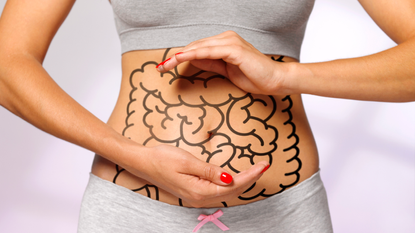Gut health: What to eat to help digestion, according to science
Good gut health is about more than probiotics. This is how to help digestion and eliminate acid reflux


Gut health is one of the biggest factors in good digestion, but there's more to it than that: new evidence has found a healthy gut contributes to a tip-top immune system. According to a report by John Hopkins University, a "huge proportion of your immune system is actually in your GI tract" and it can have a part to play in fighting lots of diseases, including cancer.
What's more, evidence increasingly shows the gut has a big role to play when it comes to your mental health. A study in the British Medical Journal showed anxiety might be alleviated by regulating gut bacteria by changing diets. A "diverse energy source" comprising lots of different kinds of food was 86% more effective at regulating anxiety symptoms.
So what should you be eating to regulate gut health? For starters, you'll want to get more fibre in your diet. Fibre is essential to keeping our bowel movements regular and healthy, preventing constipation which can damage our digestive tract. An increased intake of fibre is also very likely to protect against bowel cancer.
You can get more fibre from the following sources:
- Whole grain bread, pasta and breakfast cereals such as oats
- Fibrous vegetables like broccoli and carrots
- Peas, beans and pulses like chickpeas
- Potatoes and sweet potatoes, or yams, with the skin on
- Fruit like apples, pears and berries

There is some evidence that probiotic foods advertised as being full of "good bacteria", like yoghurts, can help your gut. However, this is disputed, with some studies showing probiotics having very little effect.
According to John Hopkins University, probiotics are shown to be effective in approximately 36% of studies. The UK National Health Service recommends taking probiotic supplements every day for at least four weeks, so there's no harm in adding some good bacteria to the mix.
One of the most important things to do when adjusting your diet for better gut health is to drink more water, usually from one of the best water bottles for the gym. Without lots of water, fibre cannot do its job and regulate your digestive system, so ensure you're taking on the recommended two litres of water a day to keep your digestion at its best.
Get the Fit&Well Newsletter
Start your week with achievable workout ideas, health tips and wellbeing advice in your inbox.
If you're finding your gut health is acting up, causing acid reflux or painful bloating, there are some foods to avoid. Caffeine is a big acid reflux trigger, so try and avoid, coffee, chocolate, fizzy drinks and caffeinated teas when you can. However, peppermint tea has been known to quell digestion problems, and is frequently drank after dinner as a restorative.
Spicy foods are another big trigger. If you're trying to avoid painful acid reflux, don't opt for curries, chilli or anything likely to have a large amount of spices in it. You can also get a more varied diet with some of the top supplements, including the best vitamins for women over 50, the best supplements for joints and the best fish oil supplements.
Matt Evans is an experienced health and fitness journalist and is currently Fitness and Wellbeing Editor at TechRadar, covering all things exercise and nutrition on Fit&Well's tech-focused sister site. Matt originally discovered exercise through martial arts: he holds a black belt in Karate and remains a keen runner, gym-goer, and infrequent yogi. His top fitness tip? Stretch.
-
 I struggled to achieve full range of motion in my hips until I tried this one hip-loosening stretch for five minutes a day
I struggled to achieve full range of motion in my hips until I tried this one hip-loosening stretch for five minutes a dayStretching Can a stretch be life-changing? This hip stretch certainly was for me
By Lou Mudge Published
-
 Forget push-ups—try this trainer’s bodyweight alternative to develop your strength and mobility
Forget push-ups—try this trainer’s bodyweight alternative to develop your strength and mobilityWorkout The beast push-up can help you build functional strength and protect yourself from injury, whatever your fitness level
By Harry Bullmore Published